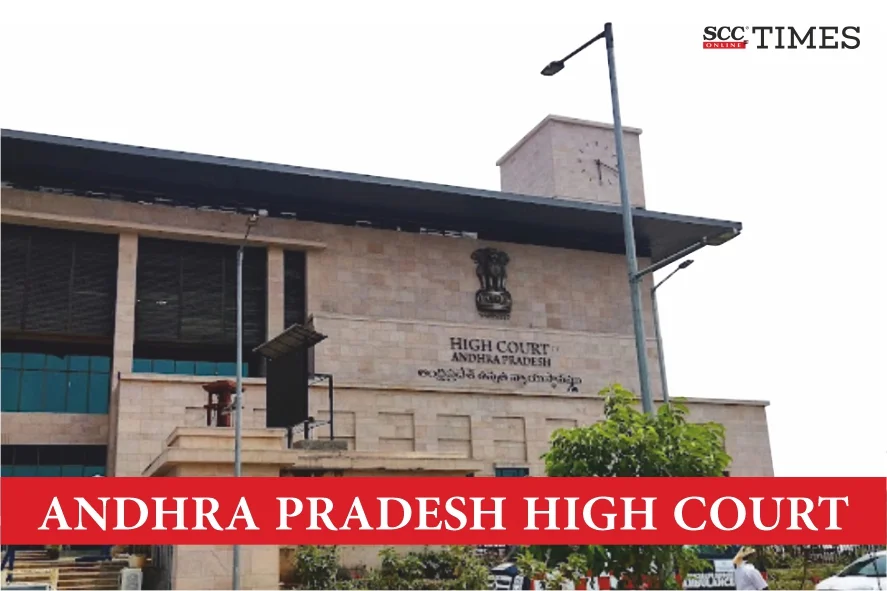Andhra Pradesh High Court: A petition was filed by the husband being aggrieved by the order passed by Family Court rejecting the prayer for reconciliation via video conferencing. Ravi Nath Tilhari, J., held that for the purposes of reconciliation in matrimonial matters before the Family Courts video-conferencing is not permissible
The petitioner (husband) and the respondent (wife) were married on 05.12.2020 as per Muslim law in Hyderabad. The wife filed a petition before the Family Court, Vijayawada, seeking restitution of conjugal rights, alleging that the husband, who works in Canada, withdrew from the marital relationship without reasonable cause. She also contended that he falsely filed a divorce petition in Canada, despite the court was lacking jurisdiction.
During the proceedings, the husband filed an interim application seeking permission to attend reconciliation hearings via video conference, citing his inability to secure leave from work in Canada. The wife opposed this, arguing that he had been evading legal proceedings for over 1.5 years and that allowing video conferencing could lead to external influence from his mother and sister, who reside with him.
The Family Court dismissed the husband’s request, holding that both parties’ consent was necessary for reconciliation via video conferencing and that external influence was a valid concern. Aggrieved by this order, the husband filed the present civil revision petition under Article 227 of the Constitution of India.
The issue under consideration is whether in matrimonial disputes, at the stage of reconciliation, appearance of the parties or any of them for reconciliation process, is legally permissible through video conferencing? And if it is permissible, under what circumstances and conditions, if any?
Reliance was placed on Santhini v. Vijaya Venkatesh, (2018) 1 SCC 1, wherein the Supreme Court held that the hearing of the matrimonial disputes has to be conducted in-camera. In camera proceedings are to be conducted if the Court considers it appropriate . After the settlement fails and when a joint application is filed or both the parties file their respective consent memorandum for hearing of the case through videoconferencing before the Family Court concerned, it may exercise the discretion to allow the said prayer. The Supreme Court observed that ‘after the settlement fails’, if the Family Court feels it appropriate having regard to the facts and circumstances of the case that videoconferencing will subserve the cause of justice, it may so direct. From the aforesaid, the law as settled is that direction for hearing of the case through videoconferencing may be given by the Family Court, subject to conditions but, that is after the settlement fails.
The Court remarked that “the present is a case at the stage of settlement/reconciliation. So, it is not the case after the settlement has failed. The request in the present case, for videoconferencing, is for the purpose of reconciliation/settlement proceedings, by the husband/petitioner.”
In Santhini (supra), Supreme Court also discussed that the reconciliation requires presence of both the parties at the same place and the same time so as to be effectively conducted. The spatial distance will distance the possibility of reconciliation because the Family Court Judge would not be able to interact with the parties in the manner as the law commands. By virtue of the nature of the controversy, it has its inherent sensitivity. The Judge is expected to deal with care, caution and with immense sense of worldly experience absolutely being conscious of social sensibility.
In Santhini (supra), Supreme Court also discussed that the procedure of videoconferencing which is to be adopted when one party gives consent is contrary to Section 11 of the 1984 Act. There is no provision that the matter can be dealt with by the Family Court Judge by taking recourse to videoconferencing. When a matter is not transferred and settlement proceedings take place, which is reconciliation, it will be well-nigh impossible to bridge the gap. What one party can communicate with other, if they are left alone for some time, is not possible in videoconferencing and if possible, it is very doubtful whether the emotional bond can be established in a virtual meeting during videoconferencing. Videoconferencing may create a dent in the process of settlement.
In Santhini (supra), the Supreme Court also noted that in matrimonial disputes that are covered under Section 7 of the 1984 Act where the Family Court exercises its jurisdiction, there is a statutory protection to both the parties and conferment of power on the court with a duty to persuade the parties to reconcile. If the proceedings are directed to be conducted through videoconferencing, the command of the section as well as the spirit of the 1984 Act will be in peril and further the cause of justice would be defeated. Therefore, we are disposed to think that once a settlement fails and if both the parties give consent that a witness can be examined in videoconferencing, that can be allowed. That apart, when they give consent that it is necessary in a specific factual matrix having regard to the convenience of the parties, the Family Court may allow the prayer for videoconferencing.
Thus, the Court concluded that that in view of the law laid down in Santhini (supra),
(i) for the purposes of reconciliation in matrimonial matters before the Family Courts videoconferencing is not permissible, and
(ii) it is only after the efforts of reconciliation and settlement fails, the videoconferencing can be resorted on the joint application filed by the parties or the memorandum of consent by both the parties, husband and wife, for such videoconferencing, in the discretion of the Court, if the Court considers it appropriate.
[Mohammad Razik Shaik v. Sufia Sultana Bano Mohammad, 2025 SCC OnLine AP 314, decided on 28-01-2025]
Advocates who appeared in this case:
Counsel for the Petitioner: Sri Suryam Gannavarapu
Counsel for respondent: Sri S. Lakshminarayana Reddy







